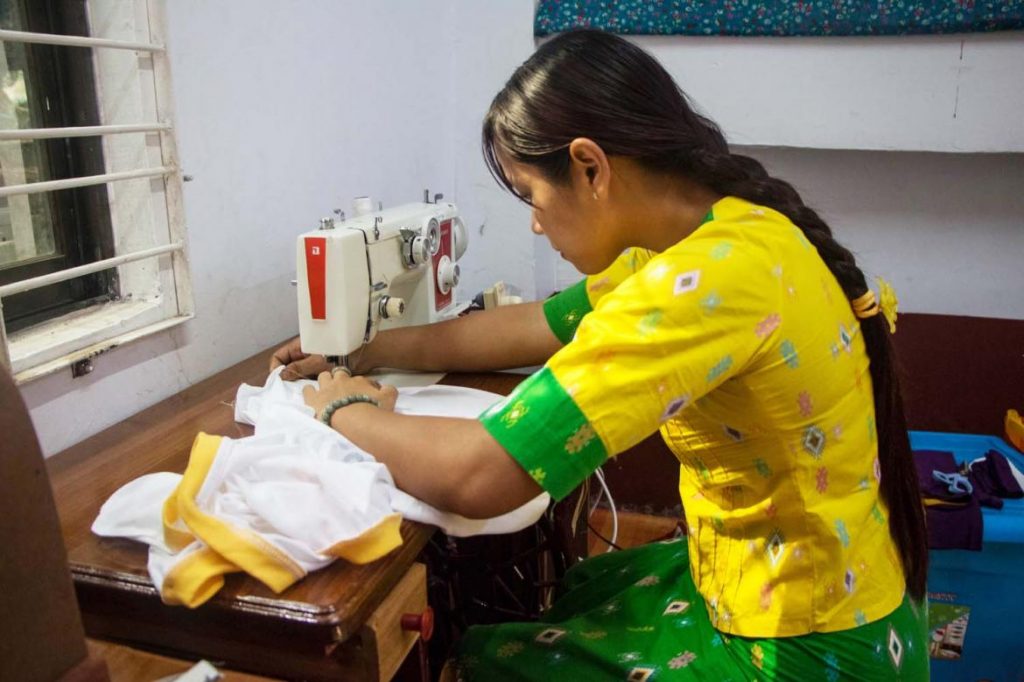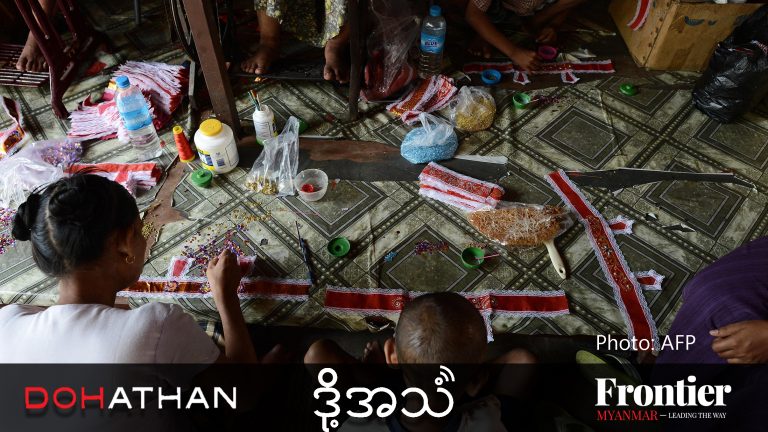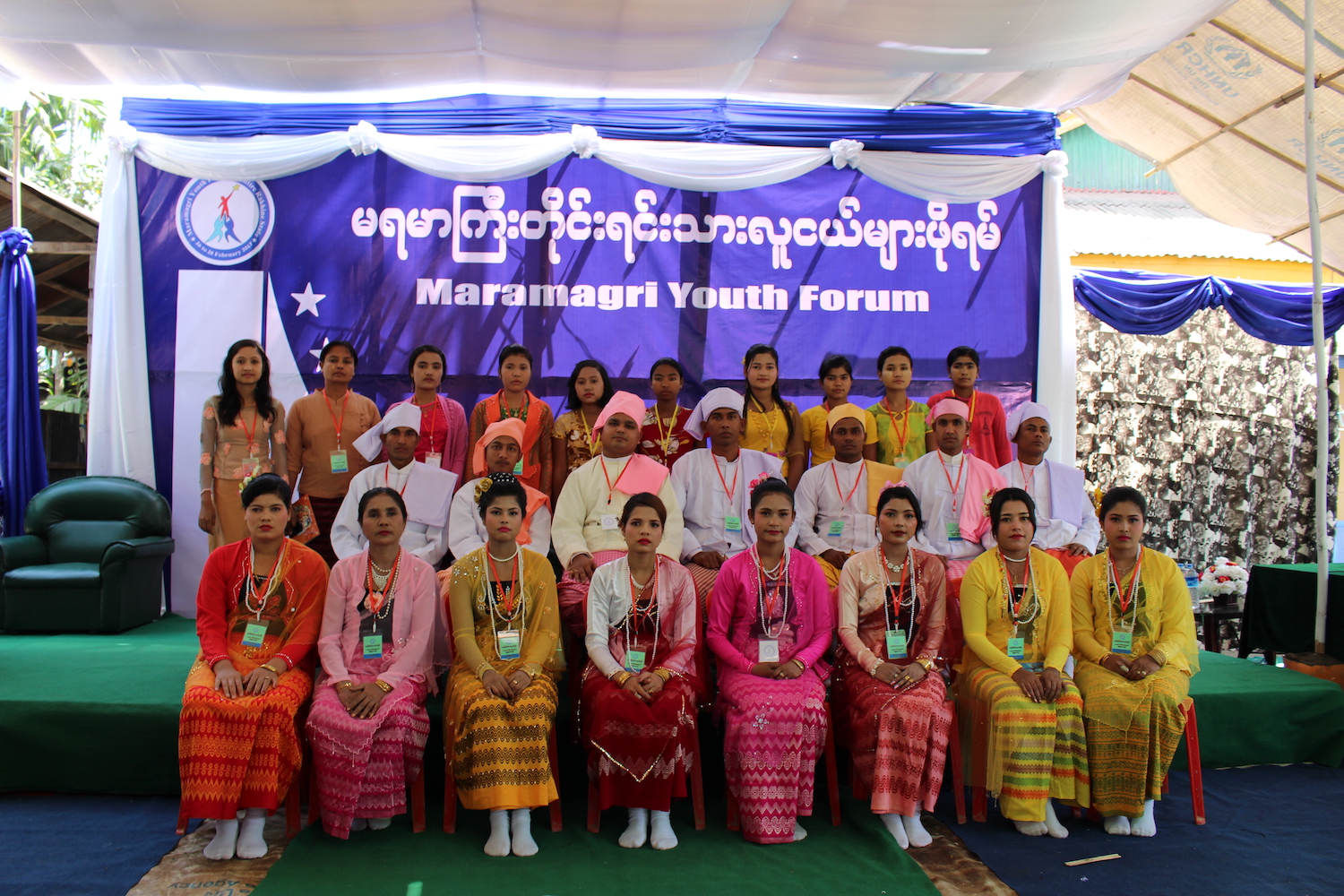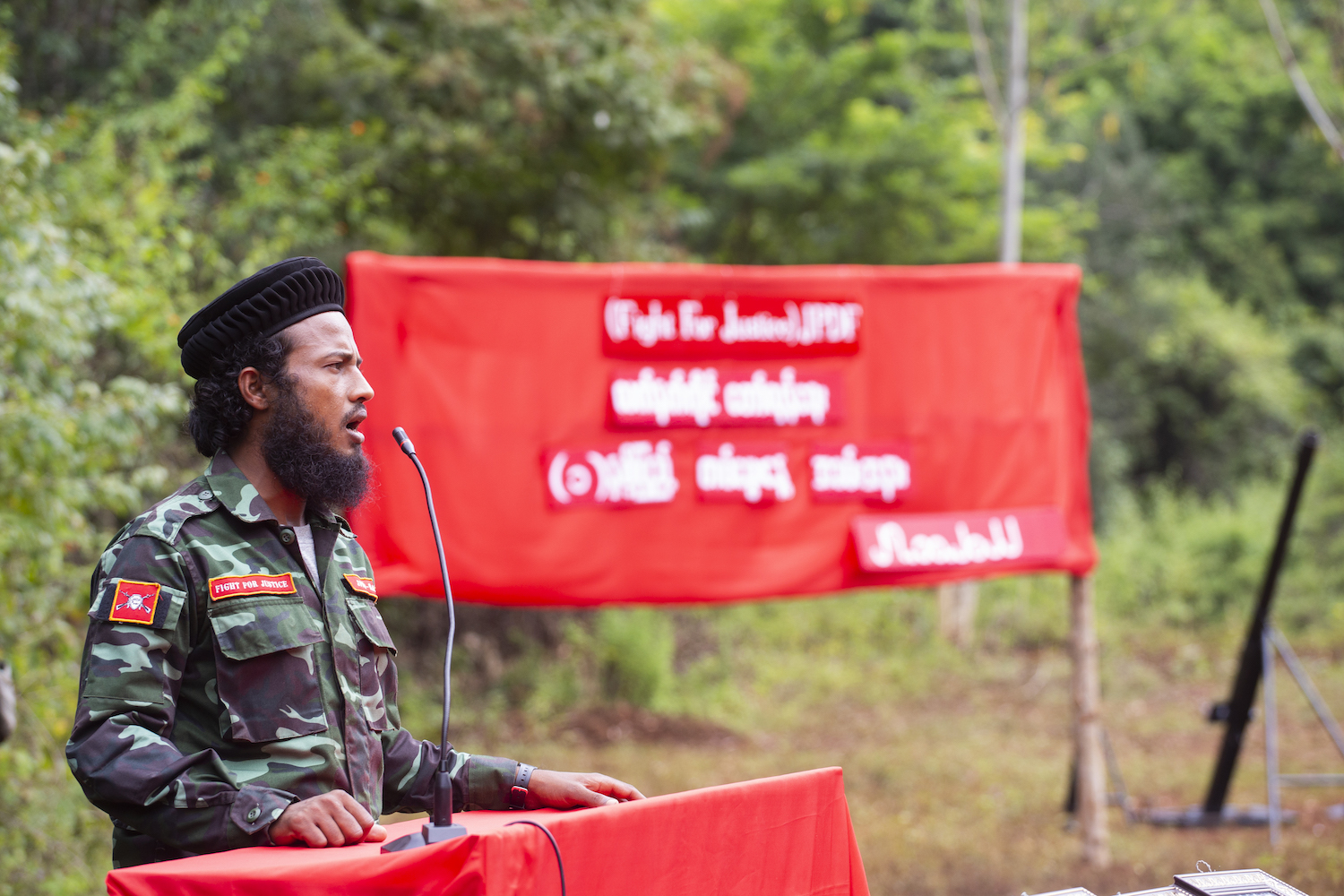Breaking into the job market can be a big challenge for women with disabilities, but a Yangon organisation is helping an increasing number enjoy greater independence.
By SU MYAT MON | FRONTIER
WOMEN ARE often marginalised in Myanmar’s patriarchal society, with only a few holding positions at the decision-making level. But for women with a disability the situation can be especially dispiriting, as they face an additional level of discrimination.
Many women with a disability are told, for example, that it is not appropriate for them to work. Some, though, are breaking free from biased social attitudes.
Ma Cheery Win, 31, lives in Yangon’s North Okkalapa Township with her husband, Ko Soe Thu, 32, their two school-aged daughters, and her parents.
When she was just 11 months old, Cheery Win contracted polio and she still requires crutches to walk.
Support more independent journalism like this. Sign up to be a Frontier member.
Her husband was initially reluctant to let her find a job, but she disliked spending her days at home and being financially dependent on Soe Thu.
“I did not like having to always ask him for money; I have my pride and I wanted to have my own income,” Cheery Win told Frontier.
But she also wanted to prove wrong those who said she was not fit for work. “That’s why I want to show my ability by working with people outside.”
Cheery Win holds a Bachelor degree in Biochemistry from Yangon’s Dagon University, from which she graduated in 2010, and had earlier attended courses in basic computer use and sewing.
Despite these skills and qualifications, finding a job wasn’t easy. Cheery Win said it was common for disabled people seeking employment to experience discrimination based solely on their appearance.
Two months ago she started working as a tailor at the Purple Lotus Inclusive Business Organization, which focuses heavily on supporting women with disabilities to be independent.
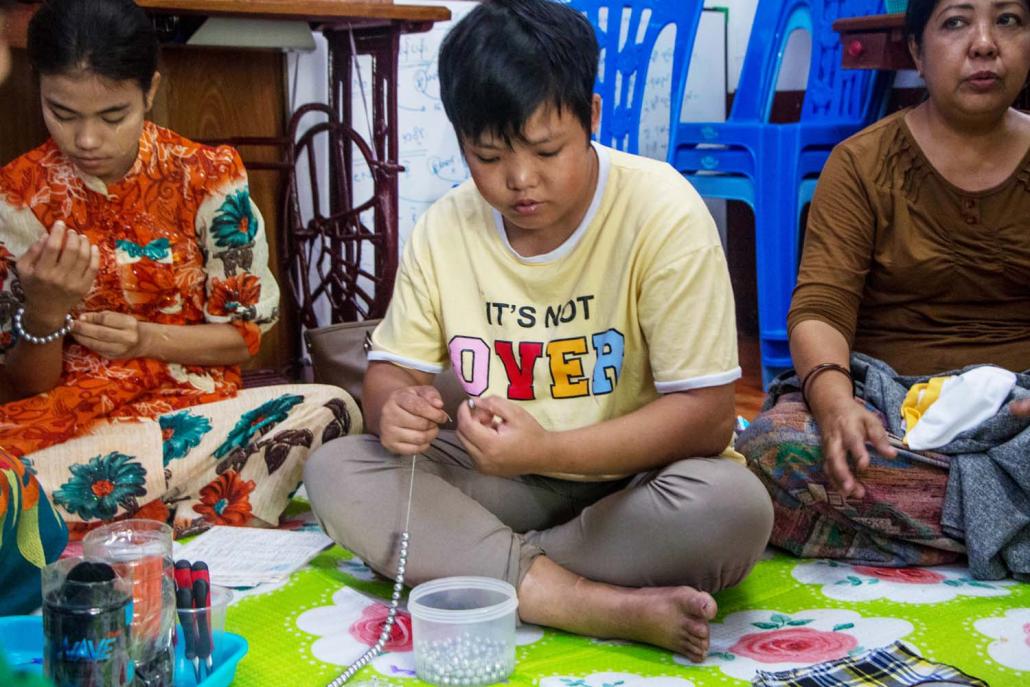
Thuya Zaw | Frontier
The organisation helps woman with disabilities to earn an income by making handicrafts that are sold at shops and supermarkets, including Ocean in Tarmwe Township. When Frontier visited, Cheery Win was cutting fabric and sewing beads and sequins onto garments.
The job means that Cheery Win commutes each day to PLIBO’s office on Kyaik Waing Pagoda Road in Mayangone Township, which involves taking two buses each way. It’s a challenge for a person with a disability that affects their legs to travel by public bus, but she says it has become easier in recent years because greater awareness about the disabled has meant that other passengers are more considerate. However, Cheery Win says it will take time before the disabled are fully accepted and treated with respect.
“I just want to be treated like an able-bodied person and not receive any special attention, like a VIP,” she said.
PLIBO’s founder, Daw Khin Myo Su, said the organisation aims to help disabled women to take control of their own lives, financially and in other ways.
Khin Myo Su said women with disabilities needed to have a hero who would inspire others like them.
“Women without disabilities are always the heroes, but why not women with disabilities?” she said.
Ma Hanli Khaing Lin, 28, an ethnic Shan from Kachin State, suffers from a leg disability due to a previous case of polio. In 2015 she moved to Yangon so she could enjoy more personal and financial independence, and now lives in Mayangone Township near the PLIBO office with a cousin.
She first travelled to the commercial capital in 2011 to attend a hairdressing course and opened her own salon after returning to Kachin State’s Mohnyin Township. A lack of customers made her decide to return to Yangon, despite pressure from her parents to remain in Kachin.
Hanli Khaing Lin said she felt emotionally and physically trapped in Kachin because her parents wanted her to stay at home and not work outside. “In Yangon it is easier for me to work and travel around, which makes me happy and satisfied,” she told Frontier.
On weekends, Hanli Khaing Lin works as a hairdresser at a salon in Hlaing Tharyar Township and she also earns money from the sequin and beadwork she does at PLIBO. She sends some of her income to her parents in Kachin every month.
Hanli Khaing Lin prefers to use crutches rather than a wheelchair so she can still take public transport, but even then she sometimes has to face drivers who refuse to allow her to board.
The 2014 census showed that 4.6 percent of the population has a disability, of whom 1.2 million were women and 1.05 million were men.
Cheery Win said it is important for the disabled to have an income and be financially independent. “I really want to support my family and being able to do so with my own income makes me feel pleased and satisfied,” she said. “I want to make decisions about how I spend instead of always being controlled by my husband.”
Cheery Win said people with disabilities deserved more recognition for what they can achieve rather than being neglected. “People don’t know my capacity,” she said. “But I know perfectly well what I’m capable of.”
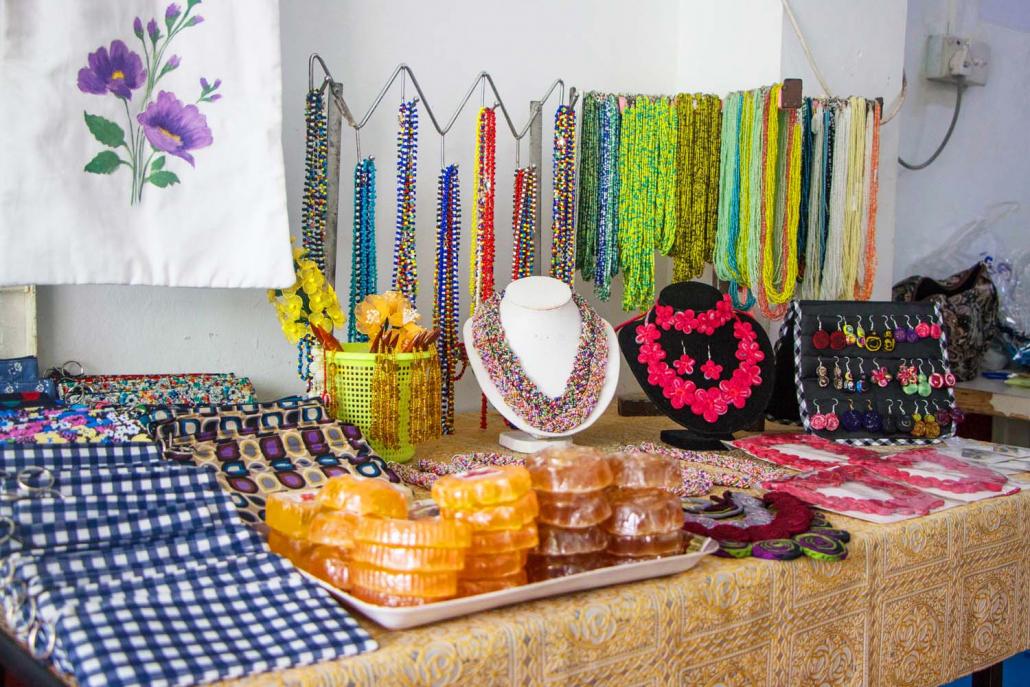
Thuya Zaw | Frontier
Job quotas on hold
The employment prospects for people with disabilities seemed to take an important step forward in a by-law to the 2015 Rights of Persons with Disabilities Law that sets job quotas.
However, the by-law, which requires employers to reserve two percent of all workplace jobs for people with disabilities or risk a fine and took effect in December 2017, is yet to be implemented.
The by-law, which had been due to go into force in March 2017, also provides for tax incentives for employers who exceed the quota and for any fines to go into a fund to support people with disabilities.
However, some observers have also warned that the quota could be hard to enforce, and may result in “ghost workers” who are hired to ensure compliance but simply collect a salary without doing any work.
U Swan Yi Ya, a director in the Rehabilitation Department, which drafted the by-law, said the delay in implementing the quota system was due to a lack of cooperation between the government and the disabled community.
The disabled community had been unwilling to work closely with the ministry because most of its organisations preferred to avoid the authorities and address challenges on their own, he told Frontier in a telephone interview.
But Swan Yi Ya said he was also not convinced that a quota for employment was the best option anyway.
“In my opinion, creating greater awareness [about the disabled] is more important than forcing a quota on employers; it should be voluntary and done willingly,” he said.
Swan Yi Ya said that as part of a national strategic plan the government is planning to conduct a survey of people with disabilities next year to compile information about their employment, education, health and needs and wants.
U Myat Thu Win, president of the Shwe Min Tha Foundation, which aims to build the capacity of people with a disability, said that most disability-focused organisations were eager to work with the ministry to improve the lives of people with a disability.
He suggested that Swan Yi Ya’s comments might reflect a “misunderstanding” between the ministry and a single organisation.
He said that progress was being made to implement the by-law, with a working committee and eight sub-committees formed under the National Committee on Rights of Persons with Disabilities to speed up the process.
The delays in introducing the employment quota were “positive”, he said, as it meant they had more time to review the advantages and disadvantages.
“Most importantly, what we want is that there is no discrimination against people with a disability,” he added.
PLIBO’s founder Khin Myo Su said the by-law did not fully protect women because it does not include a chapter on “women with disabilities”.
This meant that it would be ineffective in addressing the problems they face, because women with disabilities were more vulnerable than men.
“So we don’t believe the law will help us,” she said.


